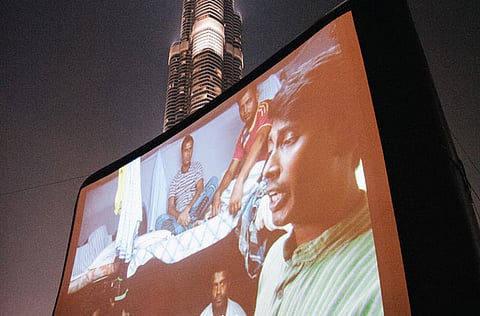Film on UAE workers screened at Burj Khalifa
Poignant documentary about Dubai workers is shown at Burj Park as part of Diff

Dubai: Not very far from the glitzy IWC Filmmaker Award at the One & Only Royal Mirage in Dubai, where Hollywood A-listers Cate Blanchett and Martin Sheen were honouring a director with the $100,000 film development prize, a very different celebration was being held at Burj Park in Downtown Dubai on Saturday night.
There were no cash prizes, no glamorous ball gowns, just a real good dose of reality. And some tears.
Champ of the Camp, the documentary film by award-winning Lebanese director Mahmoud Kaabour premiered at Screen on the Green, the Dubai International Film Festival’s (Diff) series of free film screenings introduced this year.
The evening was a poignant one: the film follows life for construction workers in the UAE, and as dreary scenes of worker accommodations filled the screen, the Burj Khalifa, which some men in the film had helped build, glistened in the background.
“Music and cinema are an integral part of Indian life,” explained Bollywood actor Jaaved Jaffery, introducing the film, set during a four-month period when workers across the UAE compete in a Bollywood song and trivia contest, with one eventual winner crowned Champ of the Camp. “And for many of us living far away from our countries, songs are our way of being close to home.
“What I liked about this film is that Mahmoud hasn’t taken away the dignity of the labourer. You don’t pity him. Instead, you get to respect the pain, the dignity with which they get on with their lives and the determination they have to give their families back home a better life. It’s a film about hope.”
Opening with a shot of the Burj Al Arab, Kaabour goes straight for the jugular as a man in a worker jumpsuit sings a sad Bollywood classic, Lambi Judaai (Long Separation) from the 1983 film Hero. He fades away, as Kaabour cuts to yet more glistening buildings and the song continues.
From there on, it’s a gritty look at the lives of these thousands of men who many of us in the UAE see every day, but know very little about. Who are they? What are their hopes and dreams? What do they think about their lives? What do they think of us?
As Kaabour ekes out these answers from his subjects, some through tears, some through laughter, and some through heartbreaking stories, it’s difficult to not be affected by their stories.
In one scene, Adnan, one of the subjects, looks up appreciatively at the glistening Burj Khalifa.
“I worked on this tower,” he says proudly. “The people up there, they are not like us. They have a good life. For us it’s only in our dreams to be able to live up there.”
There’s Dhattu, a middle-aged Indian sweeper who is saving up for his two daughters’ marriages. He’s already married one off, and reckons he’d need another four years for the next wedding. And then there’s Shohi, a young man from Bangladesh whose parents had to sell off their land so he could get a job as a carpenter in the UAE and support them. Who, it turns out, would do anything to fulfill that promise.
Interweaving their stories with the singing contest as it progresses through various rounds, Kaabour does not preach, only showing you the bare truth of life inside the places very few of us have bothered to venture in. It’s stark, yes, but it’s also full of life, as the men make do with their meagre surroundings, forging friendships and loyalties.
He gets a bit carried away sometimes, though, especially with his use of graphics to create a bit of American Idol-style drama, which ends up a bit flat. There’s also an odd music video-like scene featuring one of the workers, lip sync and all.
Yet the film’s message is strong and delivered with a lot a heart — that under the shadows of the fancy towers many of us live in, there are thousands of men toiling their hours away, some at great personal cost.
Sign up for the Daily Briefing
Get the latest news and updates straight to your inbox


